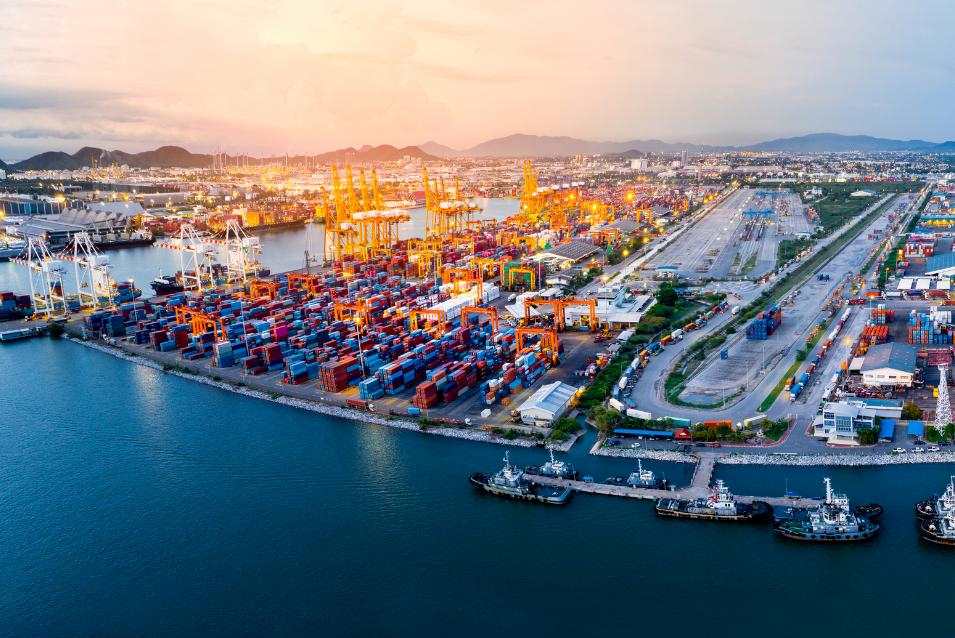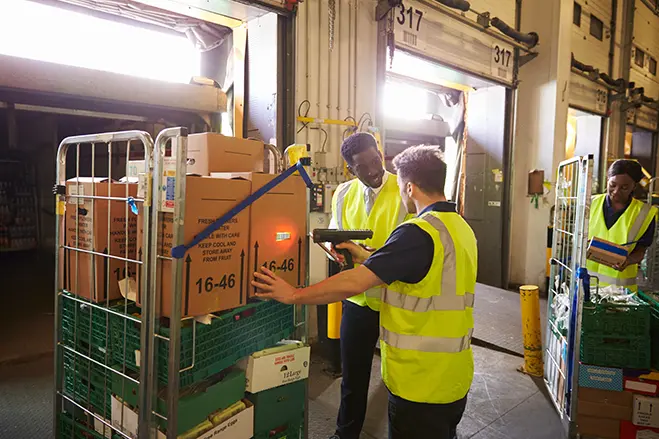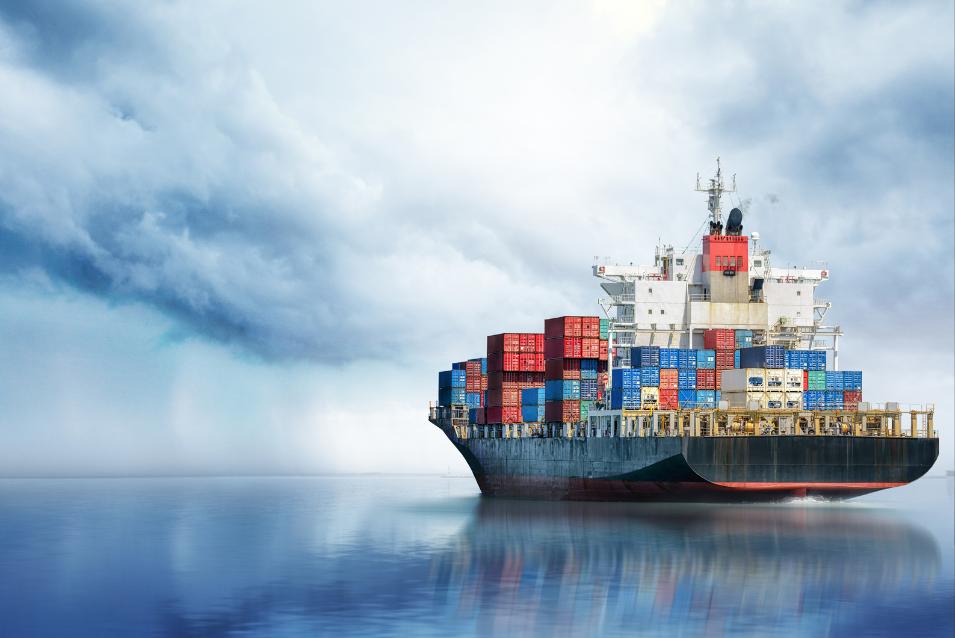The term freight forwarding has a rich history, and the roots of this essential service can be traced back to ancient civilizations, where merchants and traders sought efficient ways to move goods across vast distances. The challenges faced by early merchants, like the need for reliability, efficiency, and expertise, continue to resonate in the modern era.
Whether you’re running a small startup venturing into international markets or a seasoned enterprise managing complex supply chains, the swift and secure movement of goods is the lifeblood of your business. This is where freight forwarding services come into play.

What Is Freight Forwarding?
At its core, freight forwarding involves the coordination, management, and optimization of the transportation process. These professionals act as intermediaries between businesses and the various entities involved in shipping, overseeing crucial tasks such as transportation coordination, customs clearance, documentation, and risk management
Freight Brokers vs. Freight Forwarders
Supply chain logistics encompass a vast array of components, including transportation modes, customs regulations, documentation requirements, and the coordination of multiple entities. Moreover, factors such as varying international regulations, fluctuating fuel prices, and unforeseen logistical challenges further complicate the whole process, and freight brokers and freight forwarders play an important role here.
While their jobs may seem similar at first glance, there are distinct differences in their functions and how they contribute to a smooth cargo flow.
Freight brokers act as intermediaries between businesses seeking to ship goods and transportation carriers such as trucking companies. Their primary focus is on connecting shippers with carriers, negotiating rates, and ensuring the timely and cost-effective transportation of goods. Freight brokers do not take possession of the cargo but play a pivotal role in optimizing the logistics chain.
On the other hand, freight forwarders take a more comprehensive approach to logistics. Apart from facilitating the movement of goods, they also handle various additional services, including documentation, customs clearance, and coordination with multiple carriers. Unlike freight brokers, forwarders often take physical possession of the cargo, consolidating shipments and overseeing the entire shipping process.

What Do Freight Forwarders Do?
Freight forwarders, often regarded as architects of the global supply chain, offer a comprehensive suite of services designed to navigate the complexities of international trade. Their role extends far beyond merely transporting goods from point A to point B. Here are some key services provided by freight forwarders:
1. Transportation Coordination
At the heart of a freight forwarder’s responsibilities lies the intricate task of transportation coordination. These professionals are adept at orchestrating the movement of goods across various modes of transportation, including air, sea, road, and rail. From selecting optimal routes to negotiating with carriers for cost-effective solutions, freight forwarders ensure that cargo reaches its destination in the most efficient and timely manner. This involves meticulous planning, taking into account factors such as shipping schedules, transit times, and any specific requirements of the goods being transported.
2. Tracking and Tracing
Freight forwarders implement advanced tracking and tracing systems that provide clients with continuous visibility of the location and status of their shipments throughout their journey. By leveraging technology and communication networks, freight forwarders allow businesses to anticipate and respond to any unforeseen challenges. This commitment to transparency enhances client confidence and allows for proactive problem-solving to ensure the smooth progression of the entire freight forwarding process.
3. Customs Clearance
The complexities of international trade are perhaps most evident in the myriad of customs regulations governing the movement of goods across borders. Freight forwarders navigate this intricate landscape with finesse, managing the customs clearance process to ensure compliance with import and export requirements. This includes the preparation and submission of essential documentation, liaising with customs officials, and addressing any potential issues that may arise. By handling these regulatory intricacies, freight forwarders contribute significantly to preventing delays and facilitating the seamless flow of goods from one country to another.

4. Documentation and Paperwork
International shipping comes with a hefty load of paperwork, from bills of lading to commercial invoices and certificates of origin. Freight forwarders shoulder the responsibility of managing this extensive documentation, ensuring accuracy and compliance with legal and regulatory standards. By streamlining the paperwork process, these professionals contribute to the efficiency of the supply chain, minimizing the risk of errors that could lead to delays or complications at customs checkpoints.
5. Cargo Consolidation
Freight forwarders often engage in cargo consolidation, a strategic practice that involves combining smaller shipments into larger, more cost-effective loads. By optimizing cargo space and coordinating multiple shipments within a single container or shipment, freight forwarders maximize efficiency and reduce overall transportation costs. This consolidation process is particularly beneficial for businesses with smaller quantities of goods, allowing them to benefit from economies of scale without the need for dedicated transport.
6. Risk Management
The global logistics landscape is fraught with potential risks, ranging from transportation delays to damages and regulatory challenges. Freight forwarders take on the role of risk managers, identifying potential pitfalls and implementing strategies to mitigate these risks. Whether it’s through comprehensive insurance coverage or proactive measures to safeguard against unforeseen circumstances, freight forwarders ensure the security and integrity of the goods entrusted to their care.
7. Warehousing and Distribution
Freight forwarders often provide storage solutions and distribution services to manage inventory efficiently. This includes strategically located warehouses to facilitate easy access to transportation hubs, enabling seamless transitions between different legs of the shipping journey. By offering warehousing options, freight forwarders contribute to the overall optimization of the supply chain, ensuring that goods are stored, processed, and distributed with precision and efficiency.

Specialization in Freight Forwarding
Beyond the broad spectrum of services, freight forwarding companies often specialize in specific areas to cater to the diverse needs of industries. These specializations can include:
1. Mode-Specific Specialization
Freight forwarding companies strategically define their expertise by specializing in distinct transportation modes. For example, there are companies that specialize in air freight forwarding services, meaning they have an in-depth understanding of the intricacies of air cargo logistics, including airline regulations, cargo handling procedures, and coordination with airports. Other forwarders might focus on ocean freight, mastering the complexities of maritime logistics, such as port operations and containerization.
This mode-specific specialization enables freight forwarders to tailor their services precisely to the unique requirements and challenges associated with each mode of transport, providing clients with optimized solutions that align with the specific demands of the air freight forwarding process or any other transportation modes.
2. Industry-Specific Expertise
Recognizing the diverse needs of various industries, freight forwarding companies often develop industry-specific expertise. Whether catering to the intricacies of the pharmaceutical sector with its stringent temperature control requirements or aligning with the specialized logistics demands of the automotive industry, these forwarders tailor their services to meet the unique challenges of specific business sectors. Industry-specific expertise enables them to navigate regulatory landscapes, understand industry-specific logistics nuances, and provide tailored solutions that go way beyond generic shipping services.
3. Geographic Specialization
Some freight forwarders choose to specialize geographically, becoming experts in the freight forwarding procedures and regulations of specific regions. This might involve focusing exclusively on a particular continent, country, or even a specific trade route. By honing in on the intricacies of a particular geographic area, freight forwarders can offer their clients thorough knowledge and strategic advantages, ensuring seamless cross-border movements and compliance with local regulations.
4. E-commerce Logistics
With the rise of e-commerce, a specialized niche has emerged within the freight forwarding industry—e-commerce logistics. Forwarders specializing in this area understand the unique challenges posed by online retail, including the need for efficient last-mile delivery, inventory management, and streamlined supply chain processes. These companies tailor their services to meet the demands of the rapidly evolving e-commerce landscape, providing solutions that facilitate the smooth flow of goods from manufacturers to end consumers in the dynamic world of online retail.

Advantages and Disadvantages of Freight Forwarding
Choosing to collaborate with freight forwarders is an important decision, one filled with both opportunities and challenges that warrant careful consideration, so it is important to understand both the advantages and disadvantages of this collaboration.Advantages of Freight Forwarding
1. Transportation Cost Efficiency
One notable advantage of working with freight forwarders lies in the realm of cost efficiency. They possess the acumen to negotiate favorable shipping rates, leverage economies of scale through cargo consolidation, and optimize transportation routes. By tapping into their extensive networks and industry insights, your business can potentially achieve significant cost savings in comparison to navigating the complex logistics landscape independently. This advantage allows you to allocate resources strategically, fostering financial efficiency while ensuring the reliable and streamlined movement of goods across international borders.
2. Risk Management
Navigating the uncertainties of international trade, these companies bring a wealth of experience to identify potential risks and implement strategies to mitigate them effectively. From addressing regulatory compliance challenges to proactively managing the complexities of customs clearance, freight forwarders act as vigilant stewards of the supply chain. Their comprehensive approach includes securing appropriate insurance coverage, providing a safety net against unforeseen circumstances that could disrupt the smooth flow of goods.
3. Time Efficiency
Navigating the uncertainties of international trade, these companies bring a wealth of experience to identify potential risks and implement strategies to mitigate them effectively. From addressing regulatory compliance challenges to proactively managing the complexities of customs clearance, freight forwarders act as vigilant stewards of the supply chain. Their comprehensive approach includes securing appropriate insurance coverage, providing a safety net against unforeseen circumstances that could disrupt the smooth flow of goods.
4. Global Reach and Expertise
Companies offering freight forwarding services operate within an extensive network, offering businesses unparalleled access to markets around the world. With a nuanced understanding of diverse international regulations, cultural nuances, and logistical intricacies, top freight forwarders serve as invaluable guides through the complexities of global trade. Their expertise ensures that businesses can navigate unfamiliar territories seamlessly, capitalize on market opportunities, and establish robust supply chain connections across borders.
Disadvantages of Freight Forwarding
1. Service Costs
While freight forwarders provide indispensable services, a notable disadvantage revolves around the associated costs. Businesses opting for freight forwarding services must contend with service fees, which can include documentation charges, handling fees, and other additional costs. The financial considerations associated with these fees necessitate careful evaluation, ensuring that the benefits derived from the expertise of freight forwarders outweigh the incurred expenses.
2. Loss of Direct Control
Entrusting logistics to external freight forwarders may lead to a perceived loss of direct control over the shipping process. Businesses accustomed to managing every aspect of their supply chain internally might find it challenging to relinquish control to external entities. Striking the right balance between outsourcing logistics and maintaining oversight becomes a crucial consideration in navigating this disadvantage.
3. Communication Challenges
The global nature of freight forwarding can introduce communication challenges, especially in complex international shipments. Miscommunication or delays in information exchange can impact the efficiency of the shipping process. Establishing clear and robust communication channels between businesses and freight forwarders is essential to mitigate the risk of misunderstandings and ensure seamless collaboration.
4. Dependence on Third Parties
Freight forwarders often collaborate with third-party carriers for transportation services. A disadvantage arises when issues with these carriers, such as delays or disruptions, directly impact the overall shipping process. Businesses must carefully assess the reliability and reputation of both the freight forwarder and the carriers they work with to minimize potential risks associated with dependence on external parties.

The Freight Forwarder Agreement
After learning how freight forwarding works, you might wonder how to find a freight forwarder that suits your specific needs. A diligent search for a reliable partner involves assessing their global reach, expertise, and specialization. Seek recommendations, evaluate customer reviews, and inquire about their experience in handling specific types of cargo or industries. Thoroughly review the terms of their service agreements and ensure alignment with your business’ needs.
Once you have found the most suitable freight forwarding company, you want to make sure to formalize your partnership with a Freight Forwarder Agreement. This pivotal document delineates the terms and conditions that govern the collaboration between you, the shipper, and the freight forwarder, elucidating each party’s roles, responsibilities, and obligations in the logistics journey.
The agreement encompasses a comprehensive scope of services, from transportation coordination and documentation to customs clearance and risk management. Rates, charges, and insurance provisions are clearly outlined, providing transparency on the financial aspects of the arrangement. Understanding liabilities, limitations, and compliance with laws is vital, as it will ensure a harmonious working relationship.

Conclusion
In the complex world of global commerce, freight forwarders play a crucial role as indispensable partners, providing benefits in cost efficiency, risk management, time savings, and global reach. The potential disadvantages, such as service costs and loss of direct control, underscore the need for a reliable partner, and, with its proven track record, Elite Anywhere stands out as a trusted freight forwarding company, committed to ensuring the seamless and efficient global logistics for your cargo.
About Us

More than just a white glove delivery company: we specialize in receiving, warehousing, shipping, and national white glove delivery & installation services.
Categories
Related posts
Ready to get started?
Experience new growth opportunities and elevate your business to the next level with our unparalleled white-glove delivery service and extensive coverage. By partnering with us, you can tap into previously undiscovered potential that will drive you closer to your goals.

Latest blog posts
Best Corporate Office Interior Design Ideas
Transform workspaces with this corporate office interior design tips! Create a productive and stylish environment that inspires innovation.
How to Get Rid of Couches in Washington DC | Affordable Furniture Disposal
Need to get rid of an old couch in Washington DC? Explore cheap and eco-friendly couch disposal options—from bulk pickup and recycling to donation and junk removal services.
Stress-Free Delivery: Tips for Navigating the Holiday Rush
If you are wondering how to protect furniture in storage, the experts from Elite Anywhere are here to solve any dilemmas and help you navigate the whole process with ease.

A complete end-to-end logistics company. From receiving to last-mile delivery and everything in between, our staff delivers a true white glove experience with meticulous care and attention to detail. Need something pickup up, crated, and delivered - anywhere in the world? Let's get started!







